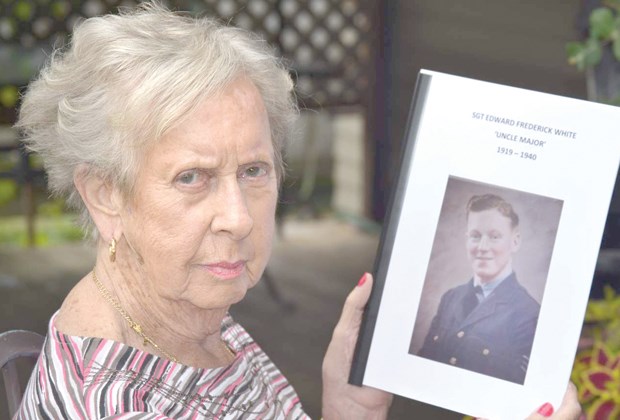The Germans captured the bridge.
Having overwhelmed French ground troops, Nazi soldiers and munitions were pouring into France's countryside, advancing to the English Channel.
On May 14, 1940, the Royal Air Force sent every available plane into combat to stem the invasion.
Edward White, 20, was a navigator on one of those planes. He was killed in action.
A little more than 74 years later, White was posthumously awarded the Bomber Command Clasp from Rupert Potter, United Kingdom Consul General in British Columbia.
White's little sister, 87-year-old Estelle White of West Vancouver, recently accepted the award.
"My brother was very important to me," Estelle says, speaking from her condo in Ambleside. "He was the kindest kid that you could think of."
She remembers her brother carrying their mother's groceries on the long stretch between the bus stop and their home in Wolverhampton, and coming home covered in bruises after a day playing football.
"I know my mother would cry when she saw all the bruises," Estelle says. "He enjoyed it immensely."
After being forbidden from buying a motorbike (too dangerous, according to his mother) or joining the police, White decided on a career in the RAF.
"He did love the air force," Estelle recalls.
Her brother was colour blind, which landed him the role of observer, or navigator.
After White's enlistment, Estelle only saw her brother once more, when she was about 13.
"We were short of everything," she says. "He brought us butter and he brought us bacon."
Later that year, the Nazis invaded Poland.
Estelle remembers the family gathering around to read White's letters home, but the letters stopped nine months later when White was one of six Allied troops killed in action in the Battle of Sedan.
News travelled slowly in 1940, and for a time Estelle and the rest of the family thought White might be alive. "My mother was dying to know why and how and when," Estelle says.
After failing to find out anything definitive from the British Air Force or the BBC, Estelle's mother discovered the plane's rear gunner had survived as a prisoner of war. Eventually, they exchanged letters.
"I remember me putting my hand out and her putting it in my hand to read," Estelle says of the letter. "I would never, ever have written a letter like he did to my mother."
White had ejected from the plane but his parachute didn't open, according to the rear gunner.
"My mother was just. .. that was the end. He was her pride and joy, believe me, he was wonderful to her."
The war left a lasting mark on Estelle.
"I hated the Germans," she says.
She held onto that hatred into her 80s, when she broke her wrist while aboard a cruise ship. She was desperate to get to land, but the nearest country was Germany.
"I thought, 'I'm not going to Germany. I'm not going to a German hospital, not on your life.'" But overwhelmed by the pain, Estelle was out of options. "Do you know they were the most wonderful people?" she says.
"I came away from there thinking, 'That's the last time I'll ever say anything nasty about Germany.'" Estelle, who turns 88 this October, was initially reluctant to talk publicly about her brother.
"He did so much and I've done so little."



